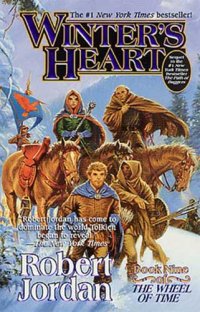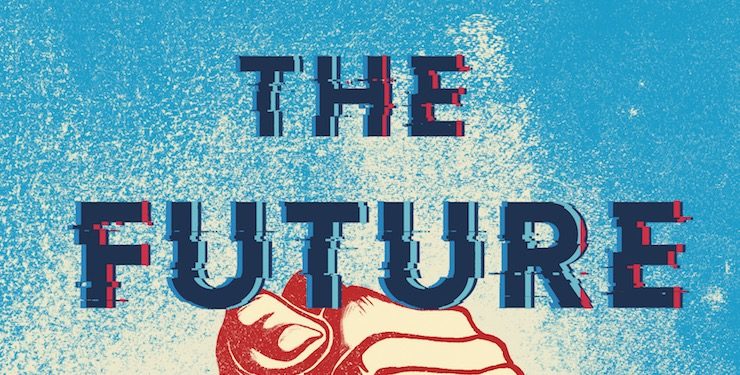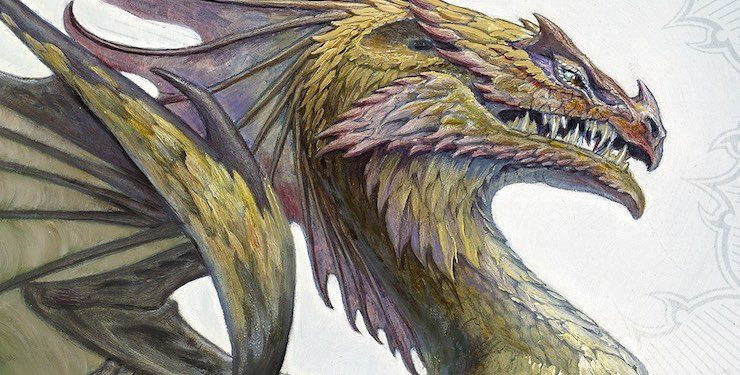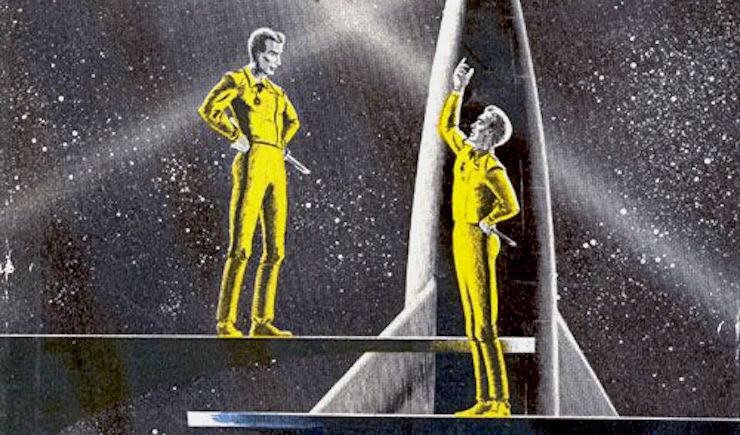Some day, Wheel of Time, and that day may never come, I will call upon you to do a service for me. But until that day, consider this Re-read a gift on my… uh, well, on this random Friday. Here, kiss my ring!
Today’s entry covers the rather stupid-long Chapter 22 of Winter’s Heart, in which some bad guys make other bad guys sleep with the fishes, and Rand helps, and we’re not sure what that makes him anymore, except not a very good family man. Or something.
Previous re-read entries are here. The Wheel of Time Master Index is here, in which you can find links to news, reviews, and all manner of information regarding the latest release, The Gathering Storm, and for WOT-related stuff in general.
This re-read post contains spoilers for all currently published Wheel of Time novels, up to and including Book 12, The Gathering Storm. If you haven’t read, read at your own risk.
And now, have an ominous trumpet solo, and a post!
 Chapter 22: Out of Thin Air
Chapter 22: Out of Thin Air
What Happens
With his hair dyed black and wearing nondescript clothes, Rand draws little attention as he follows Manel Rochaid through Amhara Market, one of only three in Far Madding that allows foreigners to trade.
Savion Amhara was one of the three most revered women in Far Madding’s history, though none was known very far beyond the lake’s shores. Two men from the city were mentioned in every history of the world, though it had been called Aren Mador when one was born and Fel Moreina for the other, but Far Madding did its fervent best to forget Raolin Darksbane and Yurian Stonebow. In a real way, those two men were why Rand was in Far Madding.
Rand is contemptuous both of Rochaid’s ostentatious clothes, and the likelihood that he would catch Rand following him. Lews Therin pants at Rand that he is the fool, and they have to get out, but Rand ignores him. He’s not worried even when pigeons start crashing into each other from ta’veren effect, since Rochaid already knows Rand is in town; Rand wonders which of the carefully placed hints he left pointing them here they had found. Lews Therin moans that being here “is as bad as death,” and Rand agrees, but thinks killing the traitor Asha’man is more important. As he continues to follow Rochaid, Rand is hit by a wave of dizziness and sees “a murky face” for a moment which makes him almost crash into a passing Aielman, who only apologizes meekly and moves on.
You destroyed them already, Lews Therin whispered in his head. Now you have someone else to destroy, and not beforetime. How many will we three kill before the end, I wonder.
Shut up! Rand thought fiercely, but cackling, derisive laughter answered him.
Rand thinks he’s lost Rochaid for a moment, but then catches a glimpse of him and hurries after, trying to remain inconspicuous. Rochaid ducks into an alley; Rand follows, only to find Rochaid waiting for him. Rochaid has a sword that looks like it has the Far Madding “peace-bond” on it (scabbard and hilt wired together), but has been cut to allow it to draw. Rochaid taunts him that he was easy to bait, and invites him to try to run.
Rand did not run. Instead, he stepped forward, slamming his left hand down on the end of Rochaid’s sword hilt, trapping the blade still half in its scabbard. Surprise widened the man’s eyes, yet he still did not realize that pausing to gloat had already killed him. He moved back, trying to get room to complete his draw, but Rand followed smoothly, keeping the sword trapped, and pivoted from the hips, driving folded knuckles hard into Rochaid’s throat. Cartilage cracked loudly, and the renegade forgot about trying to kill anyone. Staggering backwards, wide-eyed and staring, he clapped both hands to his throat and desperately tried to pull air through his ruined windpipe.
Rand was already beginning the killing stroke, beneath the breastbone, when a whisper of sound came to him from behind, and suddenly Rochaid’s taunting took on new meaning. Back-heeling Rochaid, Rand let himself fall to the ground atop the man. Hard-swung metal clanged against a stone wall, and a man cursed. Grabbing Rochaid’s sword, Rand let the motion of falling turn into a roll, pulling the blade clear as he tumbled over his own shoulder. Rochaid gave a shrill, gurgling scream as Rand came up in a crouch facing back the way he had come.
Raefar Kisman stood gaping down at Rochaid, the blade he had meant to stab through Rand instead driven into Rochaid’s chest.
Kisman and Rand face off, and Rand tells him quietly it is “Time to die,” but then they hear the Street Guards approaching. Kisman says frantically that they’ll both be hanged if caught standing over a corpse, and Rand nods reluctantly. Kisman runs off one way, and Rand another. He thinks he has more to worry about than hanging; the Far Madding Counsels had accepted Elaida’s odd decree about him, and will deliver him to the White Tower if they catch him.
Kisman moves through the crowd, deeply relieved at having avoided capture, and thinks he was a fool for letting Rochaid talk him into trying for al’Thor before the others arrived. He’s angry that he could have been deprived of his chance to live forever, but also because he’s not completely certain whether they are supposed to kill al’Thor or not.
“Kill him,” the M’Hael had ordered before sending them to Cairhien, but he had been as displeased that they were found out as that they had failed. Far Madding was to be their last chance; he had made that as plain as polished brass. Dashiva had simply vanished. Kisman did not know whether he had run or the M’Hael had killed him, and he did not care.
“Kill him,” Demandred had commanded later, but he had added that it would be better they died than let themselves be discovered again. By anyone, even the M’Hael, as if he did not know of Taim’s order.
And later still, Moridin had said, “Kill him if you must, but above all, bring everything in his possession to me. That will redeem your previous transgressions.” The man said he was one of the Chosen, and no one was mad enough to make that claim unless it was true, yet he seemed to think al’Thor’s belongings more important than his death, the killing incidental and not really necessary.
Kisman thinks that Chosen make his head hurt, then feels a scratch on his arm. A man whispers “He belongs to me,” but Kisman doesn’t see who the voice belongs to. Then he sees with horror that his arm is swelling and turning black. He tries to run, but only makes it a few steps before he falls; his last thought is to wonder what the Chosen were punishing him for.
Rand enters the inn where his party is staying to find Lan in the common room; Lan follows him upstairs without a word, and Rand thinks Lan looks dangerous even unarmed, which is not helping their low profile.
Several men at the tables glanced Rand’s way, but for some reason, they looked away hurriedly when he met their eyes.
He stops outside the Women’s Room, where men are not allowed; inside, Min, Nynaeve and Alivia are chatting with the innkeeper, Mistress Nalhera. Rand is not sure he believes Nynaeve’s story that Alivia had “insisted” on coming along, and notes the ostentatious amount of expensive jewelry Nynaeve is wearing, though she’s hidden her Great Serpent ring. Calling her “Wife,” he tells Min he needs to speak with her, trying to be polite by Far Madding standards; he tells through the bond that Min is delighted by the title. Alivia, looking very different from the subdued woman Rand vaguely recalls from the Seanchan campaign, challenges Nynaeve on taking so long to respond, and Nynaeve glares at her before standing. Rand hurries upstairs with Lan, and tells him briefly what happened; Lan only comments that at least one of them is “done,” and goes to pack his and Nynaeve’s things. Rand goes to do the same in his and Min’s room; the women enter, and Min asks why they are packing, adding with a laugh that Mistress Nalhera thinks Rand would have better manners if Min “switched him every morning.” Nynaeve snorts and asks who would want a man you could make “jump through hoops,” and Rand and Min both stare at her in amazement. Alivia opines that Nynaeve thinks about men too much, but Nynaeve ignores her, and Rand explains what happened and why they have to leave. All three of the women stare at him, and Rand doesn’t understand why; Nynaeve shakes her head before leaving, and Alivia tells him he has too much to do to get killed, and should let them help. She leaves, and Rand asks Min if she’s had any viewings about Alivia; Min answers, all the time, but none that make sense.
“Rand,” she said slowly, “you did all that, killed one man and faced another, and… Rand, I didn’t feel anything. In the bond, I mean. No fear, no anger. Not even concern! Nothing.”
“I wasn’t angry with him.” Shaking his head, he began shoving clothes into the hamper again. “He just needed killing, that’s all. And why would I be afraid?”
“Oh,” she said in a small voice. “I see.” She bent back to the books. The bond had gone very still, as if she were deep in thought, but there was a troubled thread worming though the stillness.
Rand promises not to let anything happen to her, and she smiles and promises the same. She adds that Alivia is right, though, and if he can describe these men for them, they can help him search. Lews Therin murmurs about dead men not being quiet, but Rand ignores him, suddenly realizing that he could draw Kisman and the others well enough that anyone could recognize them.
Except, he had never been able to draw in his life. Lews Therin could, though. That should have frightened him. It should have.
Isam studies the room’s reflection in Tel’aran’rhiod, unbothered by the flickering changes in the items in the room.
He could not use Tel’aran’rhiod the way the Chosen could, but here was where he felt most free. Here, he could be who he wanted to be. He chuckled at the thought.
Stopping beside the bed, he carefully unsheathed the two poisoned daggers and stepped out of the Unseen World into the waking. As he did, he became Luc. It seemed appropriate.
Luc stabs the two figures in the bed repeatedly until he is sure they are dead, then lights a candle so he can see their faces, thinking of his enjoyment at getting to kill those two Aes Sedai in the Stone of Tear, even though that had been Isam, not him. He studies the man and woman on the bed, then steps back into the Dreamworld, where his “patron of the moment” is waiting for him. Luc knows he is a man, but nothing else, for he uses the Power to disguise everything including his voice, but Luc is sure the man had to be one of the Chosen.
Few save the Chosen knew how to reach him, and none of the men among those few could channel, or would have dared trying to command him. His services were always begged, except by the Great Lord himself, and more recently by the Chosen, but none of the Chosen Luc had met had ever taken such precautions as this.
Luc tells him his victims were not the right ones, which the man says is “a pity.” Luc asks if the man wants him to try again; the man replies, maybe, but only when he tells Luc to, and reminds him to keep quiet before making a gateway into “a snowy forest glade” and leaving. Luc agrees it is a pity, as he had been looking forward to killing his nephew and “the wench,” but decides to pass the time hunting.
He became Isam. Isam liked killing wolves even more than Luc did.
Commentary
So, I think my main reaction to this chapter the first time I read it was rather painfully divided between wanting to be in awe of Rand for his sheer badassedness—seriously, you guys, he just crushed a man’s windpipe with like his pinky finger—and wanting to call on the men with the backwards coats and happy pills and sic them on him, because damn.
It was a bit of a shock, honestly, because I had really expected that the triple-bonding thing (and the sexing, lest we forget) from the last time we saw him was going to mellow Rand out a bit, at least for a while. But yeah, not so much!
Too much to hope for, I suppose. This whole progression of Rand’s toward the—well, not Dark Side, not yet anyway, but definitely the Somewhat Sociopathic Side—has been going on for a while, of course, but here is where I think it really started to kick into highly upsetting gear, at least in my perception.
And as always, even while being disturbed by the actual revelations here, I really like the way Jordan shows it to us. I’ve said it before but one of my favorite devices that Jordan employs in his writing is the outsider POV—showing us what our protagonists look like from a remove.
The crazy twist here, of course, is that it is actually Rand who provides this outsider POV, to himself, because he’s becoming so detached from the rational responses to his own actions that we are forced to rely on Min and Nynaeve et al to provide the proper context to judge them in—namely, that his behavior is kind of completely frickin’ scary. I remember I found it both awesome and disheartening at the same time. Still do.
But, okay, at least two of the renegade Asha’man are dead, which was frankly a relief because it indicated to me that maybe this plotline was actually going to be wrapped up in this book for a wonder. (And even more of a wonder, I was right.)
Which leads me to my standard groan of crap, Padan Fain. Not so much for what he did, because hey, one obnoxious tertiary villain down, all yays for that, but for the certainty that it meant that Fain was going to fuck up Rand’s life in some spectacular way, again, Real Soon Now. (And not at all for a wonder, I was right about that too. Pfeh.)
Kisman: We very rarely get rank-and-file Darkfriend POVs in WOT, so this was pretty interesting even aside from all the Demandred/Taim/Moridin hoopla which basically just makes me tired at this point (and which made Kisman’s mental comment about how the Chosen gave him migraines snort-out-loud worthy to me, because man, do I feel you on that one).
I’m… pretty much going to let you guys fight about this one in the comments, because I have totally given up on the Demandred thing at this point. Other than who he definitely isn’t (Taim), I Don’t Bloody Know And I Don’t Bloody Care who or what or where or why the dude is. Other than “Annoying,” I got nothing. Y’all can hug that one out; I’m just gonna wait until ToM, where hopefully he is squished like the very large and obnoxious continually-hiding-in-the-goddamn-cracks cockroach he is. So There.
Far Madding: I deliberately elided most of the description and tidbits in the narrative which tell you what kind of place it is, because this chapter was quite long enough already, thank you, but the upshot, for me, is the impression of something like a Puritan town in colonial New England, except with the genders reversed. That’s not precisely the correct analogy, but it’s as close as I can come at the moment, so it’ll do until someone comes up with a better one.
And I think I gained this impression for one simple reason: that altogether I found the whole thing pretty much exactly as infuriating as I would an actual Puritan village, for pretty much exactly the same reasons. If there are people I want to be around less than a bunch of dour, rigid, paranoid, xenophobic, close-minded, and oh let’s not forget screamingly sexist assholes, I can’t think of them at the moment.
Gah. We might talk about this more later, but for now, I think gah pretty much sums it up.
(Though I will say the name itself, Far Madding, is one of the more lovely references in WOT, in my opinion. Fun fact: I have an antique illustrated book of this poem, published in 1884, on the bookshelf behind me right now, a gift from my mother. It’s one of my favorite possessions.)
Isam/Luc/What The Bloody Hell: Otherwise known as The Scene That Made Me Rewrite The Entire Asmodean Section of the FAQ, aka Sometimes I Hate Everything. Since you’ve all already read the article (right? RIGHT?), I won’t get into how this flung everyone into a tizzy of Slayerdunnit re: Asmodean except to say that I liked the notion a whole lot more on first blush than I do now. Now, well, I pretty much think it’s bunk. We Shall See if I’m wrong!
However, whether or not Luc/Isam killed Asmodean, we do finally find out here that he was the one who killed Amico and Joiya in Tear (nailing their tongues to the door, too. You stay classy, Slayer!), as well as the Gray Man in the Tower in TDR, though honestly that entire incident still confuses me. I think we’re supposed to divine that it was Slayer who shot the arrow at the Supergirls, mainly because that seems much more his style than a Gray Man anyway, but then the question becomes why was a Gray Man there at all? Is this like one of those wacky comedies where, oops, we sent two assassins to do the same job! and hijinks ensue? Because otherwise, it makes no bloody sense to me at all. Not that it matters at this point, I suppose.
(I’m not really bringing up the second Gray (Wo)Man who showed up in Sheriam’s bed, because now I’m pretty sure that was a more or less totally separate By the way I admire your pictures very much incident.)
One thing about this scene I never noticed before was this line in particular: “Here [meaning Tel’aran’rhiod], he could be who he wanted to be. He chuckled at the thought.”
Which is kind of hilarious because I’m pretty sure he means that literally. Basically the prevailing fan theory re: Slayer before this scene was that, since we only saw Luc in the real world and Isam in the Dreamworld, the logical(ish) conclusion was that Luc was “the one who lived” (referring to the Dark Prophecy about them in TGH), and that the dead Isam was controlling his body, which is why (according to the theory) Slayer only looked like Isam in the Dreamworld. Many people also theorized, based on this, that Luc was actually a good guy, and either his “soul” (or whatever) was gone and only his body remained for Isam to pilot, or Luc was in there but trapped in your standard demonic possession sitch and just had no control over the situation.
Well, so much for that idea, eh?
As of TGS there’s still nothing on this to explain why exactly Luc is apparently just as evil as Isam, or why they are BFFs in their evilness, all texting each other like idk, u want 2 kil sum wolvz nao?, or just in general what the hell their Deal is or what purpose the character(s) is eventually going to serve. I find this lack of information… irritating.
I find his continuous linkage with Fain to be significant, though. Jordan often said that Fain was the “wild card“ character in WOT, but I would say that Slayer is just as eligible for the title as Fain is, despite having done less overall. Perhaps it is a Match Made in Evil Heaven.
Or, er, something.
Oh, and I suppose I have to talk about Slayer’s “patron.” Mostly I remember thinking that the instant assumption of many fans that he was Sammael was really perfectly logical, and once Word of God blew that theory out of the water I just kind of shrugged. This sums up the cases for who else it could be pretty well, and really isn’t outdated in any significant way (which points up how little movement we’ve had on this front in, like, ever). If you ask me, my money’s on Taim.
And that’s about what I got for this one, kids. Please assume I came up with another (or, one) clever Godfather reference to close it out, and have a fabulous Labor Day weekend if you’re American, and a fabulous random weekend if you’re not! Ciao!














